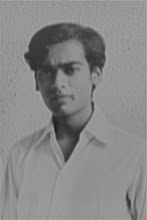My grandfather had a tough independence movement: he was a political leader among Kerala Christians, and when the administration of the state decided to fix things so Kerala would be dominated by Hindus, he found his business under attack. He spent time in jail, which shattered his health. Though thoroughly rehabilitated after Independence -- a member of Parliament and India's ambassador to the Sudan -- he suffered from diabetes and insomnia and died in his early seventies. No doubt he very much missed his wife, my grandmother, who died in her early fifties -- she had a weak heart, and it was overstrained by taking care of a large brood in difficult circumstances when her husband was in jail.
Their children, who, like their mother, shared in my grandfather's distress, are nevertheless very well. Six survive, the oldest (my father) and the youngest having succumbed to cancer. They range between 78 and 87 -- very much changed, of course, from when, as a child, I first formed my impressions of their characters and intelligence, and when they were young, glamorous, and in charge.
On a recent trip to India, I found it surprising how well these people, and others, seemed, into their eighties and nineties. I visited ten or so people of this generation, many of whom I hadn't seen in many years. I was struck by how much the same they were mentally as before, and how little affected by age in quickness of mind, mobility of body, and vitality of spirit.


When I was much younger, we thought it very fortunate when somebody lived to be eighty. Now, we are all familiar with individuals who at eighty and much older, continue to function at much the same level as they did twenty or forty years ago, and even to thrive in conversation and debate.
The post-WWI generation is going to surprise us. Once, we hardly knew anybody older than eighty: soon we are going to know many who function pretty well at a hundred. (I just hope Robert Mugabe isn't one of them.)



5 comments:
Great post! I'm wondering if we're related - one of my ancestors on the Cheeran (or Polachirackal) side of my family was an ambassador to Sudan. I don't recollect his name...I must ask my grandmother. But was your uncle from the Cheeran/Polachirackal family?
Sorry - I meant your grandfather, not uncle.
The Chalakuzhi family: I wonder if there's another connection.
My grandmother is from Cheeran but has connections with Chalakuzhi as well. She was telling me about it this weekend but I don't recall through whom she has those connections. I'll ask her and let you know. It must be another connection if you're not from Cheeran.
I found out how we're related!
My Polachirackal grandfather's (P.K.Koshy) grandfather's (Koshy Vakil) mother was from the Chalakuzhi family!
The Chalakuzhi family was thrown into jail for owning the Quilon bank, right? How long was your family in jail? One of my Polachirackal ancestors was also in imprisoned with them.
Post a Comment